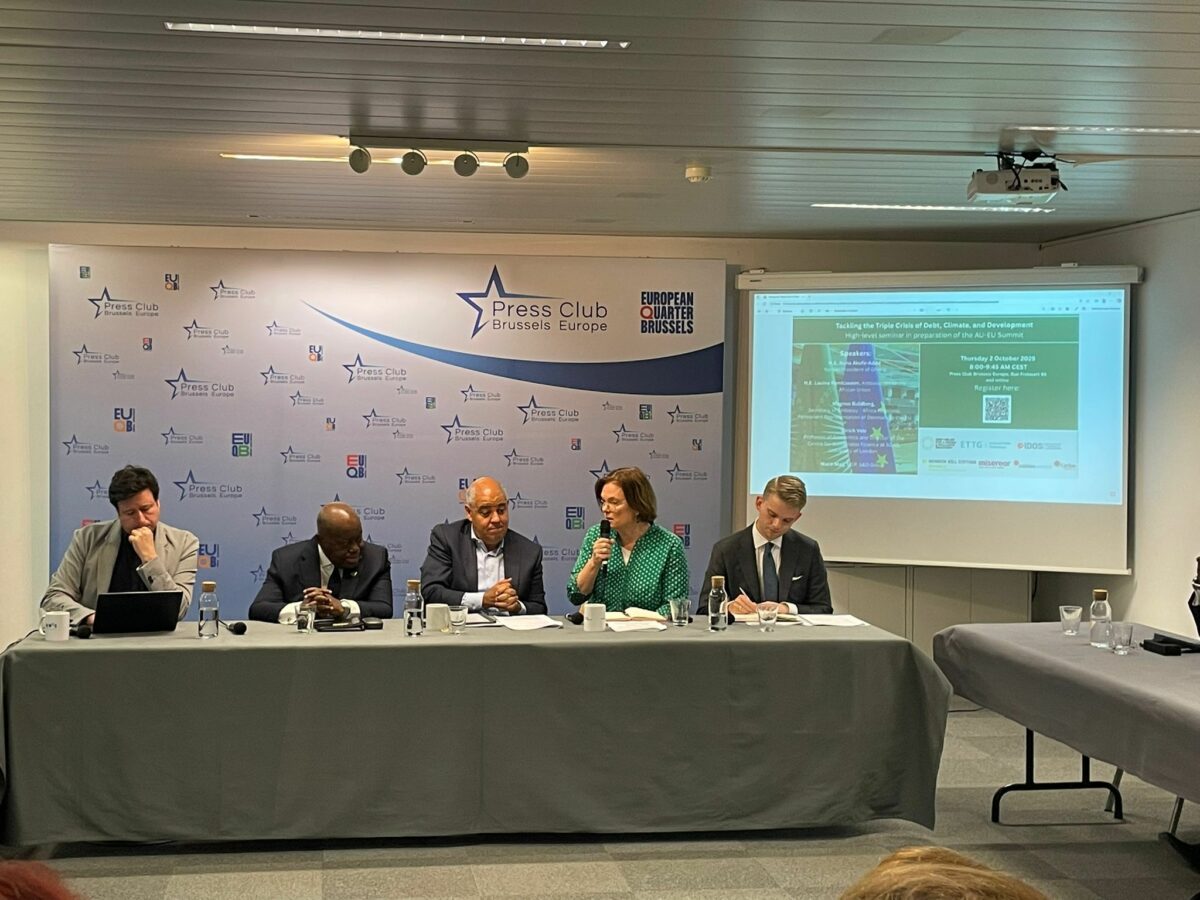As global crises converge — from rising debt distress to accelerating climate impacts and uneven development — the need for fairer, more effective international cooperation has never been greater. This was the driving force behind our recent high-level seminar on “Tackling the Triple Crisis of Debt, Climate, and Development”, held on October 2 at the Brussels Press Club ahead of the 7th EU–AU Summit in Luanda.
By Sarah Ribbert
The event, organised by the Debt Relief for a Green and Inclusive Recovery (DRGR) Project together with the European Think Tanks Group (ETTG), the Heinrich-Böll-Stiftung Brussels, Caritas Africa and Europa, Misereor and the German Institute of Development and Sustainability (IDOS), brought together leaders from Africa and Europe to exchange ideas on how to reform the global financial system and build a partnership fit for today’s interconnected challenges.
Transforming the Global Financial System
Speakers from both continents called for bold, systemic reform to address the debt crisis that continues to constrain the development and climate ambitions of many African countries.
H.E. Lavina Ramkissoon, Ambassador to the African Union and advisor to the EU, UN and African Heads of State and Ministers was clear: “The time for incremental fixes is beyond us — we need revolutionary and transformational change in the global financial architecture, and it begins with an equal voice.”
Her words were echoed powerfully by H.E. Nana Addo Dankwa Akufo-Addo, former President of Ghana, who urged Europe to stand in true partnership with Africa. “Every dollar directed to creditors is a dollar taken from a child’s future,” he said. “African nations must choose to pay creditors or protect our citizens. This is not a system that frees us — it binds us.”
Calling for a comprehensive global debt relief initiative in this Jubilee Year, 2025, he added: “This is not charity. It is partnership, and an investment in a prosperous Africa that contributes to global stability and shared growth.”
(Read President Akufo-Addo’s full speech here.)
Rethinking Debt and Development
From the civil society perspective, Wesley Chibamba of Caritas Africa emphasized that small-scale fixes will not solve a broken system. “All major recent reports on debt call for systemic reforms,” he said. “The G20 Common Framework has failed — it is slow, creditor-driven, and not fit for purpose. We need models that put human beings and human development at the centre.”
Ulrich Volz, Professor of Economics at SOAS, University of London, added that while other global powers are deepening their ties with Africa, the EU must strengthen its engagement if it is serious about shared prosperity, resilience, and a just green transition.
Europe’s Strategic Interest
Several speakers from the European side recognized that Europe’s own long-term future is deeply linked to Africa’s success. Marit Maij, Member of the European Parliament, underlined that “Europe is only doing well if its neighbours are doing well,” urging policymakers to look beyond short-term domestic concerns.
Magnus Guldberg from the Danish Permanent Representation to the EU agreed, calling for Europe to “make better use of its toolkit” when engaging with Africa — from innovative financing mechanisms to climate partnerships and debt relief instruments.
From Problem to Partner
Across the discussions, one message was clear: Africa is not a problem to be managed but a partner in finding solutions. Tackling the triple crisis of debt, climate, and development requires real partnership, rooted in mutual accountability and structural reform of global systems that have long placed African countries at a disadvantage.
As the EU–AU Summit approaches, the seminar underscored that this is the moment to move from dialogue to action — from crisis management to systemic transformation.
Watch and Read More
A full recording of the seminar is available here, and further reporting can be found via the EU Observer’s coverage of the event here.
For further insights on Africa’s vicious cycle of debt and climate change, explore this policy brief.
